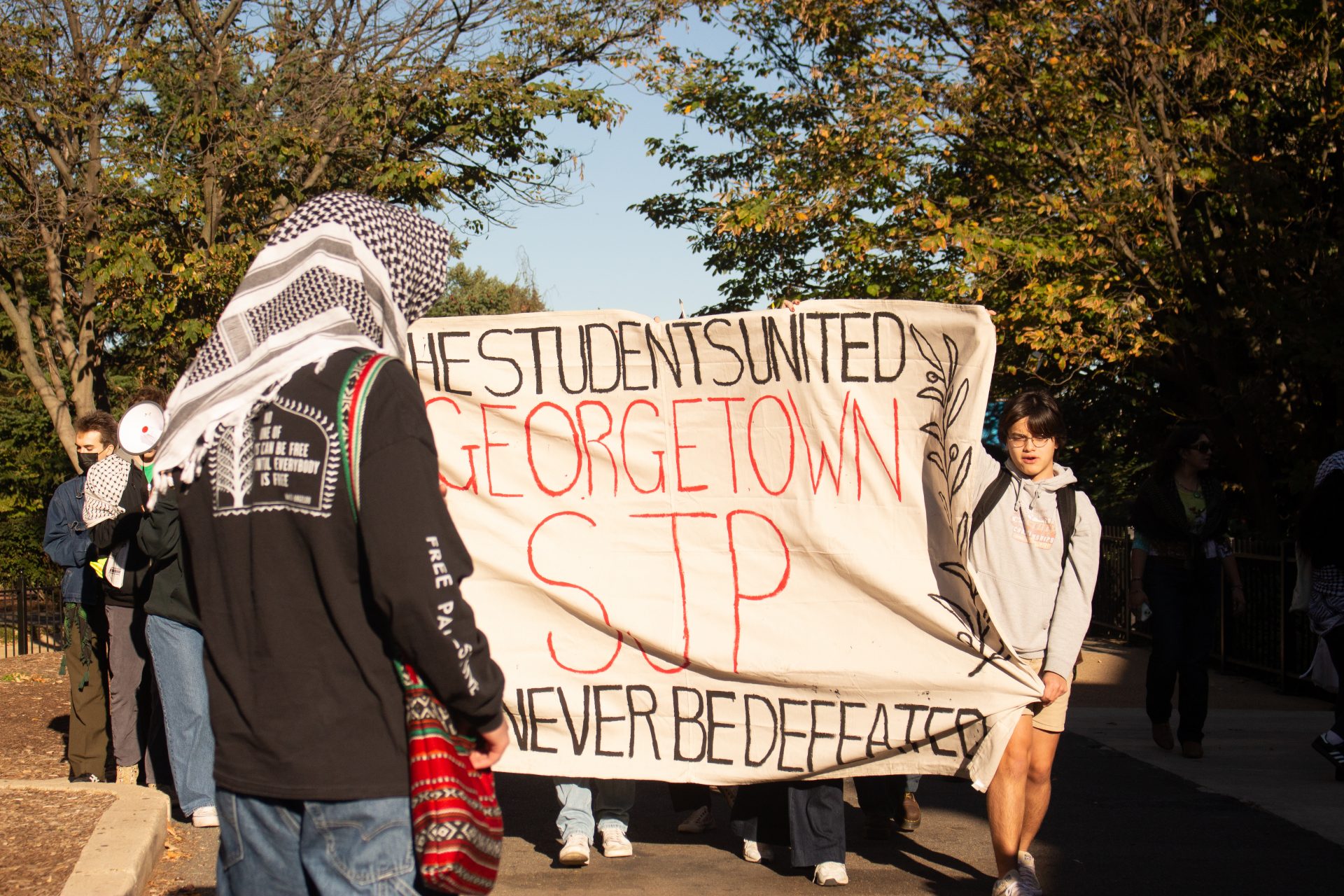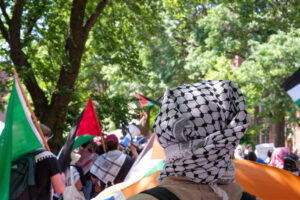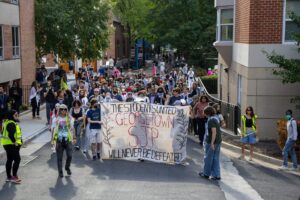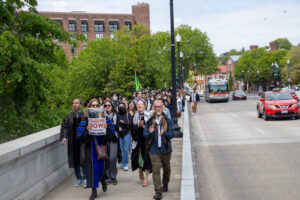Community members gathered at the steps of Healy Hall for a rally and march organized by Georgetown Students for Justice in Palestine (SJP) on Oct. 10. The rally came as part of SJP’s ‘Week of Rage,’ marking the one-year anniversary of Israel’s renewed bombardment of Gaza.
Demonstrators commemorated the Palestinians Israel has killed and restated SJP’s demands of the university. Their demands include that Georgetown must call for an end to Israel’s occupation of Palestine, commit to freedom of speech and expression for SJP and other activist groups, divest from corporations that contract with the Israeli military, end its study abroad program in Tel-Aviv, and institute a PalTrek program.
“The martyrs of Palestine fuel our struggle,” Dream Champell Aldrich (CAS ’25) said. “We will never forget them, we will never abandon them, and we will continue to creatively organize and mobilize until Georgetown has disclosed its investments, divested its holdings in corporations complicit in genocide, and ended all academic partnerships with the Zionist entity.”
Hamas attacked Israel on Oct. 7, 2023, killing 1,200 people and taking another 250 hostage—101 remain in Hamas’s captivity. Since then, Israeli airstrikes and a ground invasion of Gaza killed at least 42,000 Palestinians. Since the start of the bombardment, Israel has destroyed approximately a quarter of all buildings in Gaza and displaced nearly the entire population.
SJP, along with other groups, have hosted several protests and rallies over the past year in solidarity with Palestinians. Last spring, Georgetown students joined the DMV Gaza Solidarity encampment at George Washington University, which lasted two weeks before the Metropolitan Police Department cleared the encampment.
On Thursday, 80 students rallied to honor those lost in the past year. Aldrich, who spoke first, reminded demonstrators of the privilege they hold compared to students in Gaza.
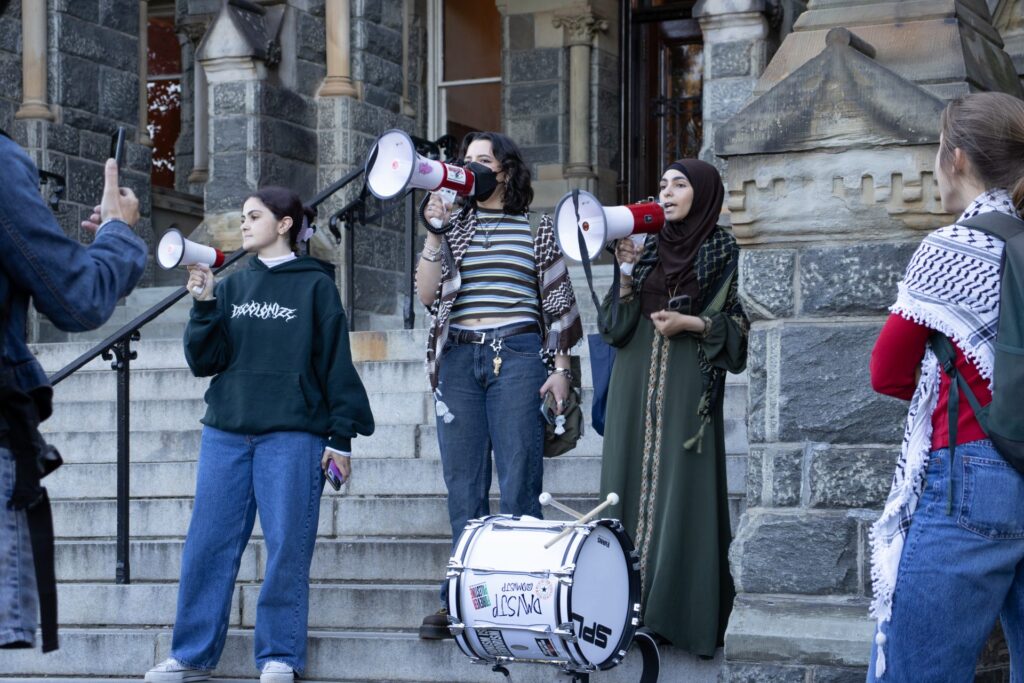 Photo by Izzy Wagener
Photo by Izzy Wagener
“Students in Gaza have no universities to go to this semester, and are living under an active genocide, and yet they remain resilient,” Aldrich said. “The suffering and repression we face here at the imperial core does not amount to anything inflicted to the students of Palestine.”
The ongoing invasion is the most recent escalation in a dispute over land that has existed since before the state of Israel was founded in 1948, which displaced over 700,000 Palestinians. Since Hamas’s military takeover of Gaza in 2007, Israel has blockaded the Gaza Strip, restricting access to safe water, food, education, and medical treatment.
Over the last year, human rights groups, including Human Rights Watch and Amnesty International, have accused Israel of war crimes, including blocking aid from entering Gaza and using starvation as a weapon of war.
As well as honoring those killed by Israel, students also restated their demands of the university.
Georgetown currently holds $40.5 million in investments in Alphabet and Amazon, two companies contracted by the Israeli government for Project Nimbus, a $1.2 billion contract to develop cloud computing and AI facial recognition technology. Amnesty International researchers found that Israel uses facial detection in widespread surveillance of Palestinians, and The New York Times reported that similar technology has been used in Gaza since late 2023. SJP and other campus organizations have held several protests urging Georgetown to divest its shares in these companies.
After chants and Aldrich’s speech, demonstrators marched from the Healy steps to the intersection between Leo’s and the HFSC. There, Fida Adely, director of Georgetown’s Center for Contemporary Arab Studies, read a section of Georgetown’s Socially Responsible Investing policy, which guides how the university invests its endowment. As part of its “Do no harm” strategy, the university said it will use “reasonable efforts” to avoid investing in companies “directly and significantly involved in the production of weapons that are intended to be used for indiscriminate destruction.”
“Now, if we’ve ever seen indiscriminate destruction, it’s been in the past year,” Adely said. ‘What we are asking our institution is to live up to the policy that it already has.”
Then, demonstrators marched to the intersection underneath the bridge connecting the Leavey Center to the patio near Regents Hall. Some displayed a sign from the top of the bridge reading, “Why Hasn’t Georgetown Divested?”
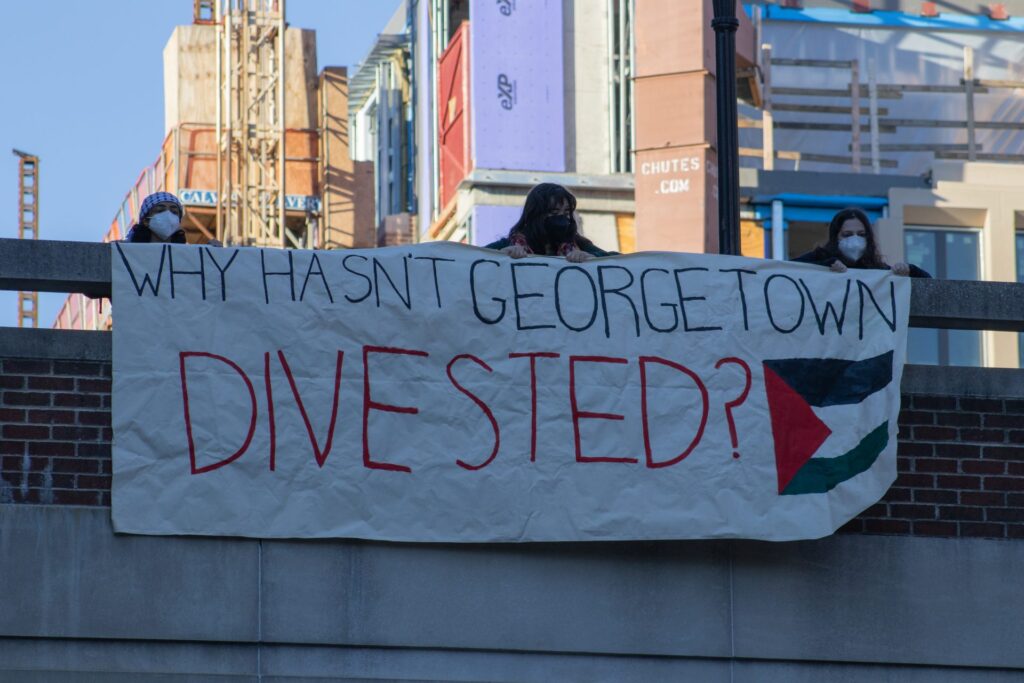
Photo by Izzy Wagener
The banner mirrored one with the same message used in student protests in April 1986 to protest South African apartheid. The banner was hung from a second floor balcony , during a two-week sit-in on White Gravenor patio—part of student protests which pushed Georgetown to divest nearly $9 million dollars from corporations supporting apartheid in September 1986.
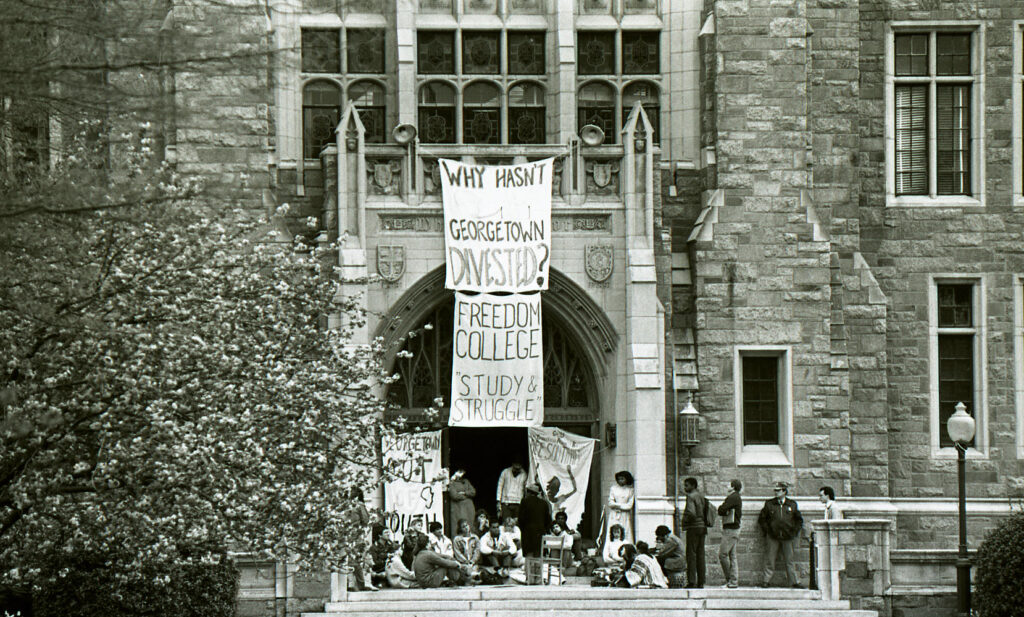 Photo courtesy of Lauinger Library
Photo courtesy of Lauinger Library
Photo from Lauinger Library
At the intersection, Lukas Solomon (SFS ’26), co-president of SJP, spoke.
“It is our responsibility to attack Georgetown’s bottom line—its real priority, the thing it really values: its capital and its reputation—until this university has no choice but to answer to the demands of the thousands of students, professors, staff members, workers, and alumni for an end to institutional complicity,” he said.
In Red Square, the rally’s last speaker, Rahma Abdallah (SOH ’27), called on students to remember Georgetown’s rich history of successful student protest, including for divestment during apartheid.
“Where we stand right now, students have protested against the U.S. imperial war in Vietnam, against Georgetown’s investment in apartheid South Africa, against Georgetown’s ties to anti-worker corporations like Aramark and Starbucks, against Georgetown’s refusal to confront and repair its history of enslavement and ongoing treatment of the descendants community, and the list goes on and on,” she said.
This history, Abdallah said, lays the groundwork for SJP’s continued demands for the university to divest from corporations “complicit in genocide,” and continued protest against Israel’s bombardment of Gaza.
“Georgetown has a long tradition of throwing brutal police at student protesters instead of engaging with them, but Georgetown’s students have an even longer history of defiantly and steadfastly protesting in spite of all their oppression until their demands are met, and that is a tradition we will uphold,” Abdallah said.
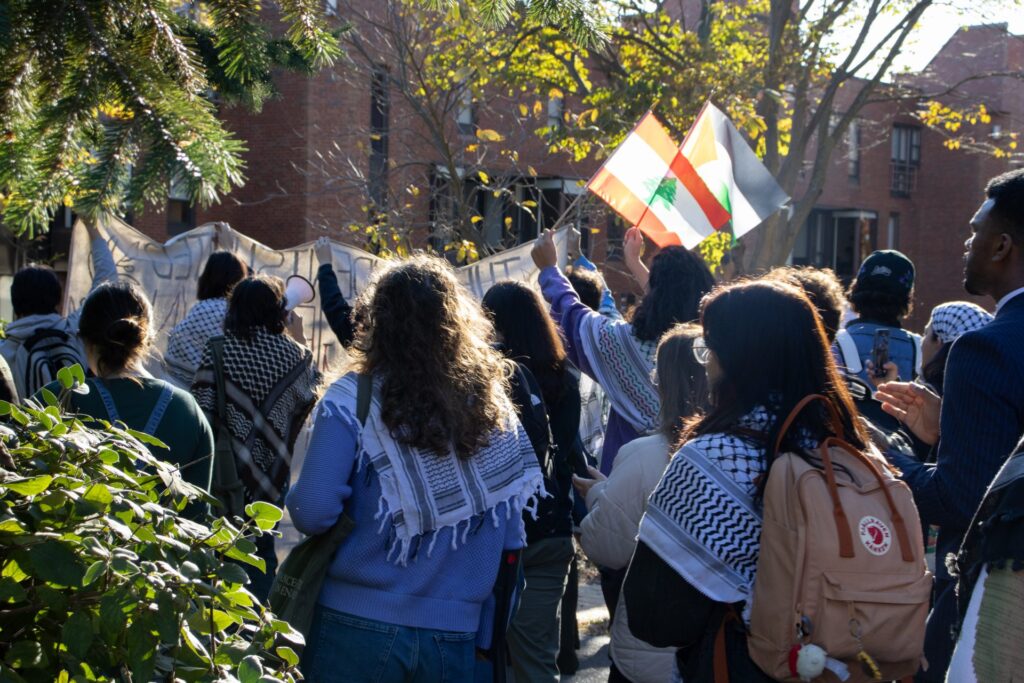 Photo by Izzy Wagener
Photo by Izzy Wagener


